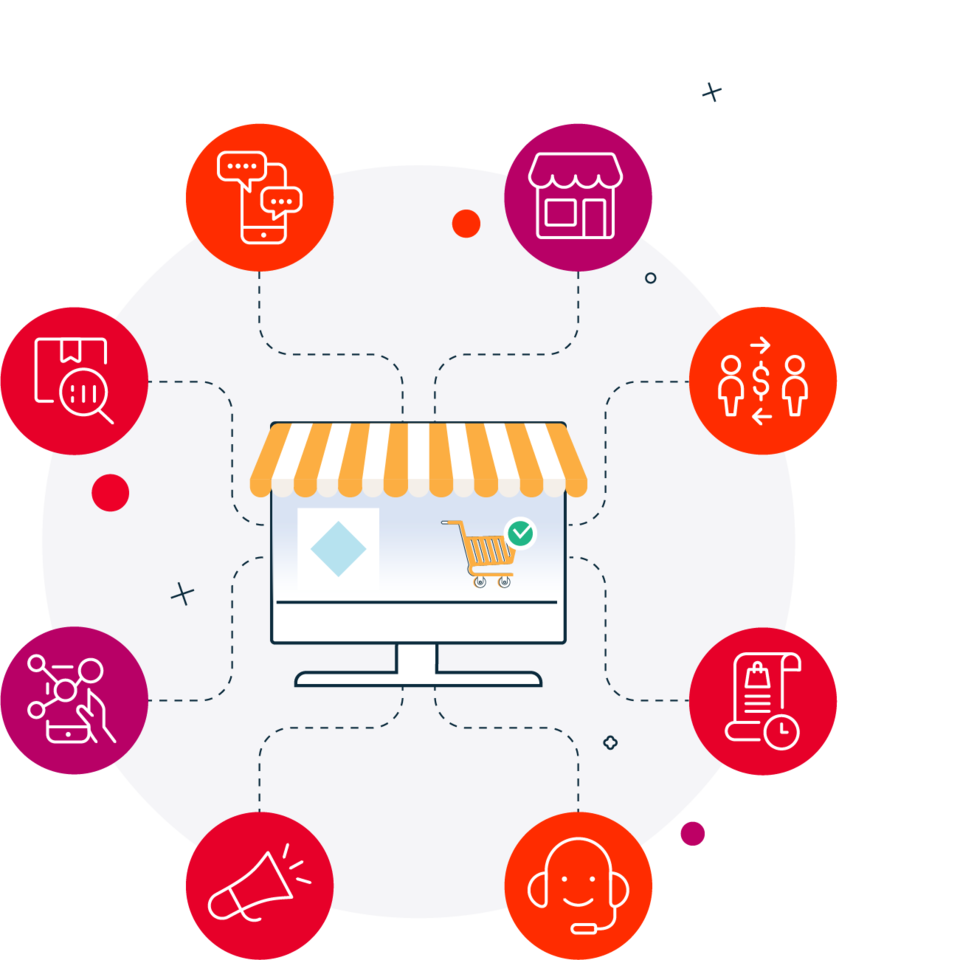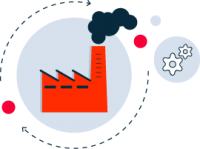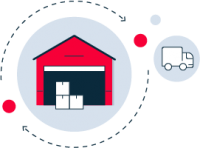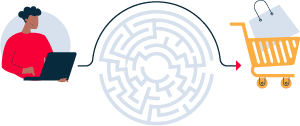eCommerce for B2B
In recent years digital technology has revolutionized B2B eCommerce. Greater automation, targeted marketing, and more intuitive purchasing journeys have resulted in the widespread adoption of e-commerce platforms amongst industry-leading B2B businesses.
As a result, many more companies are now looking to make the most of digital opportunities and establish a B2B online presence. This movement has been further accelerated by the Covid-19 pandemic. We’ve created a quick guide to B2B digital commerce and how Ibexa DXP can be used to grow your business.
Defining B2B eCommerce
Put simply, eCommerce for B2B is any transaction or relationship between two businesses that takes place over the internet.
Companies using B2B eCommerce are everywhere. They include organizations in the following sectors:
Manufacturing
Companies that take raw materials or small components and use them to create something of value to sell to another business. Circuit boards are an excellent example of this type of commerce. The manufacturer takes the required raw materials, works them into a circuit board, and sells the boards to electronics manufacturers. They then combine the boards with other components to create a laptop, radio, or television, for example.
Wholesale
Companies that buy large quantities of a single good at a reduced rate, then sell the good at a higher price to individual retailers.
Distribution
Companies that work with other businesses to improve the visibility of their products, link them to potential customers, and facilitate purchases. At the most basic level, distributors are tasked with increasing sales for their partners.
While this is by no means a comprehensive list of B2B business types, it does include three of the most popular B2B business models. As technology evolves and e-commerce advances, new, profitable models will continue to emerge.
B2B vs B2C eCommerce
One of the easiest ways to understand B2B eCommerce is to contrast it with B2C (business-to-consumer) commerce.
B2C typically involves smaller purchases and significantly smaller financial transactions, while B2B is the realm of mass-purchasing and significant investments. Similarly, B2C sales are much more influenced by whim and individual customer impressions, whereas B2B sales are structured around large teams that develop long-term professional relationships with their suppliers. Unlike the B2C market, B2B purchasing decisions are generally more rational and carefully calculated.
In B2C businesses, the marketing department rules, as marketers have far greater influence over individuals' behavior than they do over groups of people. In B2B companies, it's more important to manage relationships with existing clients and demonstrate your ability to continue meeting their needs. This is because big purchasing decisions will often be made by a buying committee.


Exploring B2B digital transformation
B2B companies existed long before the digital age. However, the internet has radically altered the way such organizations conduct business. Just as traditional high-street B2C companies have been disrupted and threatened by the advent of online shopping, B2B organizations that don’t emphasize digital transformation and B2B online sales will also struggle.
Ibexa DXP ensures businesses work more efficiently and can serve their customers digitally. At the same time, they reduce the costs and effort associated with a wide range of business processes.
Their automation capabilities can ensure repeat orders are filled and dispatched without sales agents having to remember the refill date or intervene in the purchase process. Marketing materials can be sent to potential customers in multiple languages via a remarkable array of communication channels. Inventory can be managed, and seasonal surges or shortfalls accounted for.
By streamlining these critical processes, Ibexa Commerce allows businesses to concentrate their resources where they're most needed and accelerates business growth.
How can you accelerate business growth with B2B eCommerce?
Digital commerce platforms help B2B organizations in two main ways:
Drive revenue growth
E-commerce opportunities introduce your business to a new audience and fresh markets with an ability to test out different sales models. Some companies have already switched to digital-only operations, so they will only engage with B2B suppliers, manufacturers, and wholesalers that have a digital presence. If you have no e-commerce offering, you're missing an opportunity to reach out to new buyers and grow your revenue
Reduce operating costs
Manual business processes are typically costly and time-consuming. While some processes will always need to be carried out by an employee, plenty can be digitalized and automated with the right tools and technologies. This reduces your operating costs, resulting in greater efficiency and drives business growth.
Ibexa Commerce
To demonstrate just how powerful B2B digital commerce platforms can be, we’re going to demonstrate three ways you can utilize Ibexa Commerce to grow your business.
Simplify complicated B2B purchase journeys
As we've already mentioned, B2B purchases are rarely the decision of a lone individual. Instead, they're signed off by a team. Each team member has specific responsibilities that must be fulfilled to ensure the purchase meets the buyer's requirements. This means the purchase journey can get complicated.
Greater flexibility - especially when it comes to pricing
Unlike the B2C sector, B2B pricing is highly variable and dependent on various factors. Historically, adjusting prices to reflect shifting market realities was complicated, labor-intensive, and prone to errors.
Today, B2B digital commerce platforms allow for real-time, always-accurate pricing updates that ensure both you and your customer get the best deal possible.
Revolutionize the B2B customer experience
In the past, it wasn't easy to link up the disparate parts of the B2B organization. If a client usually did business by telephone and then placed a one-off order via email, the information required to complete the order may not have been immediately available. Rather than moving freely between channels, customer data was locked into specific channels and organizational silos. This was undeniably frustrating for most clients.
Control and streamline the customer experience
With a modern platform, you can control and streamline the entire customer experience, guiding customers through the purchase process and allowing them to interact with your organization in any way they deem necessary. They can move between channels seamlessly, their entire purchasing history is just a click away, and you can tailor your product recommendations to take advantage of their known preferences.
Why Ibexa is your ideal choice
Ibexa is ideal if you want to begin transforming your business but don't want to commit to a large initial expenditure. Based on a modular design, Ibexa DXP ensures that you can add new capabilities when you need to.
You can integrate Ibexa Content, Ibexa Experience and Ibexa Commerce with your existing systems and harness the advantages of having an interconnected digital ecosystem.









